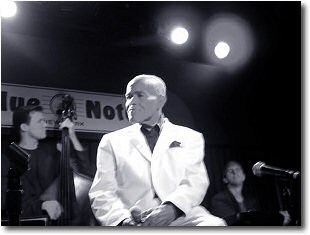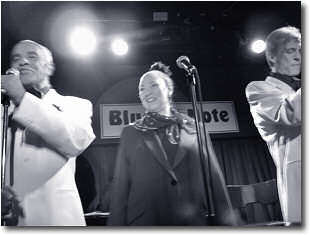|
Jon Hendricks & Company
Blue Note, New York - August 21, 2005
by
Rodney A. Suarez
photo by Rodney A.
Suarez
|
 |
LHR Redoux:
Jon Hendricks on Vocals
Judith Hendricks on Vocals
Joel Hazard on Vocals
The Jon Hendricks Trio:
Peter Michelich on Piano
Neal Miner on Acoustic Bass
Andy Watkins on Drums
Jon Hendricks, a jazz legend and winner of 7 Grammy awards, performed
a brief weekend set, backed by a trio of piano, bass and drums that was anything
but standard. The trio opened up the night with a swinging song that featured engrossing
solos by each member. The song's intent was to warm up the audience before bringing
out Mr. Hendricks. The performance of the trio was an example of complimentary and
melding interaction between the members. This was prevalent throughout the evening's
set.
Jon Hendricks, who is 83 years young, has been involved with the world of
Jazz almost from birth. He is cited with being the "father of vocalese," a style
of vocal composition that sets lyrics to entire orchestrations of jazz standards
(what is vocalese??). This is different than "scat" singing which is a vocal style
of singing nonsense syllables as solos of jazz songs improvised on the spot. While
the style of "vocalese" was pioneered by singers like Eddie Jefferson and
 King
Pleasure, Mr. Hendricks perfected the art with the famous vocal group, Lambert,
Hendricks and Ross (LH&R). Being the main lyricist for the trio, Mr. Hendricks set
lyrics to the multiple parts of standards made famous by the likes of Miles Davis,
Count Basie, Duke Ellington, Art Tatum, Benny Golson
and a host of other composers that would be too long to list. King
Pleasure, Mr. Hendricks perfected the art with the famous vocal group, Lambert,
Hendricks and Ross (LH&R). Being the main lyricist for the trio, Mr. Hendricks set
lyrics to the multiple parts of standards made famous by the likes of Miles Davis,
Count Basie, Duke Ellington, Art Tatum, Benny Golson
and a host of other composers that would be too long to list.
When the trio was done, Jon Hendricks was introduced to the stage
to the respectful applause of the audience. Remembering seeing him almost 20 years
earlier, I noted that he still has the same enthusiasm and exuberance onstage as
he had then. Mr. Hendricks started with an original composition called
Feed Me that amply prefaced
a classic song from his LH&R days called Home Cookin', a Horace Silver
composition to which he set lyrics. When a piano solo started, one could not help
notice how connected Mr. Hendricks stayed with what was happening onstage, chuckling
in admiration of certain lyrical lines played by Peter Michelich.
Next, the mood was taken over by the bossa nova with two compositions. The
first, Tell Me the Truth,
began in a bossa nova style, but gave way to an R&B/fusion/avant garde crescendo,
reminiscent of what Miles Davis or
Herbie
Hancock were doing in the 70's, before returning to the subtle
bossa nova. He prefaced the song saying that though it was written many years ago;
the lyrics sound as if they could have been written today – a commentary to current
affairs. The second song, Estate
(Italian for summer), featured on Hendricks's Freddie Freeloader
recording, was a moving bossa nova that set a beautiful and relaxing mood. Mr.
Hendricks' subdued singing featured timely, and not overbearing, comping by the
pianist. It definitely gave the atmosphere a feeling of the presence of Antonio
Carlos Jobim.
Mr. Hendricks spoke with the audience, reminiscing of days gone by and a
recent award received by France – La légion d'honneur, their most prestigious
award, for his participation in the invasion of Normandy during the Second World
War.
In line with the Second World War, Hendricks moved into a Benny Golson
composition named Blues March.
The intro performed by the drummer, Andy Watkins, reminiscent of a marching
band's signature style, gave way to Hendricks' classic vocalese rendition of this
standard. Hendricks performed a scat solo that began slowly but quickly ascended
to a lightning ensemble of syllables that told audiences "I can do that too."
While the song moved into a piano solo, Hendricks seemed intent on listening to
every note the pianist had to play. He then gave the audience a treat by performing
a scat solo in the styling of a bassist, playing an "air" bass and singing the notes
as if he were actually playing them. He had done something similar on a classic
LH&R song called Swingin' 'Till
the Girls Come Home, which he played bass scat solos announcing and imitating
five separate bass players from the bebop days. What a treat! This led directly
into a solo by the bass player. I can only imagine that Neal Miner was thinking,
"How do I follow this?" I know I would.
Mr. Hendricks then spoke of his roots in Toledo, his beginnings with Art
Tatum, and how he is currently teaching as a professor of Jazz and Vocalese
Studies at the University there. How he has brought together an orchestra of vocalists,
aptly named Vocalstra. He explained how he wanted to create the LH&R recording,
Sing a Song of Basie, with this type of ensemble singing all the instruments
of the Basie orchestra, but was unable to (due to circumstances beyond his control)
and relied on overdubbing to achieve his intentions, with astounding success, I
might add.
As part of his LH&R reminiscing, Mr. Hendricks gave the audience another
treat by introducing a new version of the classic trio called LHR Redoux.
He brought onstage his wife, Judith Hendricks, taking the place of Annie
Ross, and Joel Hazard, taking the place of Dave Lambert. This was a re-introduction
of the vocalese style created, revolutionized and
 mastered
by the original LH&R. The trio swung right into Ellington's
Take The A Train. If you closed your eyes, you
could almost hear Duke sitting at the piano and his horn section masterfully playing
the melody line and solos. This reviewer only hopes that the LHR Redoux goes
right into the studio to immortalize this sound onto a recording that will definitely
last a lifetime. mastered
by the original LH&R. The trio swung right into Ellington's
Take The A Train. If you closed your eyes, you
could almost hear Duke sitting at the piano and his horn section masterfully playing
the melody line and solos. This reviewer only hopes that the LHR Redoux goes
right into the studio to immortalize this sound onto a recording that will definitely
last a lifetime.
Next LHR Redoux sang Everything Happens To Me,
a song recorded by Sinatra in the
40's with the Tommy
Dorsey Orchestra, and sadly closed the set with Count Basie's
Avenue C. Both songs saw
the trading-off between all three vocalists. It was a treat to hear Judith,
as she was featured on Hendricks's recordings going back into the 80's. Joel
Hazard possesses an extraordinary vocal range which lets him amply carry baritone
notes up to alto phrasings. LHR Redoux is certainly a beautiful and exquisite
tribute to the great vocal tradition started by LH&R.
Basking in the applause and adoration from the audience, Mr. Hendricks
forgot (unintentionally, of course) to introduce the band members, but quickly
corrected that situation by running back onstage and asking the sound engineer to
turn the microphone on again. He introduced the players one by one, noting that
his band has been with him for more the 13 years. While the band members did not
have issue with not being introduced, it always feels good to be acknowledged. This
is something that Mr. Hendricks has never forgotten – those that helped him and
made an impact on his life and career.
This reviewer wished him many happy returns and, watching artists like
Jon Hendricks, I realized the music does keep us alive, and as long as we continue
to embrace it and participate, we will not go down easily or quickly. Speaking with
Mr. Hendricks after the show, I brought up his extraordinary work on writing the
lyrics for the entire
Manhattan
Transfer recording called Vocalese. He was autographing the liner
notes for me when he began reminiscing about a picture in the notes, and how it
was originally supposed to be a semi-serious picture. He had told a joke and everyone
started laughing, and this is what was captured in the picture. The smile that is
always on his face speaks of all the fun he has had and continues to have.
Insert an opinion
|
© 2000 - 2025 All the material published on Jazzitalia is exclusively owned by the author. Moreover it is protected by International Copyright, so it is forbidden any use of it which isn't authorised by the rights' owner.
|
This page has 5.794 hits
Last Modified Date: 09/10/2005

|
|

